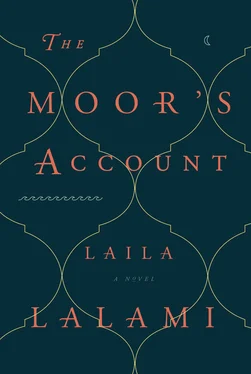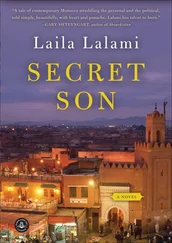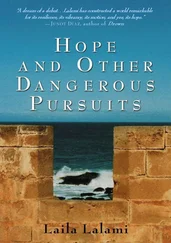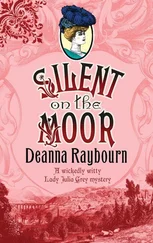While the friars took a nap in their quarters, Oyomasot and I visited the tribe’s elders. Of course, we had no cure for the pox that afflicted their people, but we listened to the stories they told us and we shared our own. We described what we had seen in Tenochtitlán, the temples the Castilians had destroyed to erect their own, the slaves with branded faces, and the mission that Coronado was heading. But later that night, when we returned to the lodge where we were staying, we found the two friars waiting for us.
Oyomasot walked past me into the house and left me standing by the door with them, under the light of the moon. Father Marco, the older one, was very tall and had bulbous eyes that seemed to take notice of everything: my clothes, my satchel, even the gourd I carried, which had been given to me as a gift by one of the town elders. The friar spoke Spanish with an accent that hinted of his birth in France. Estebanico, he asked, how far are we from the wealthy settlements Cabeza de Vaca spoke of?
This is one of them, I replied.
Petatlán is one of them? But it does not look the way it should.
How should it look?
It seems much poorer than I expected.
Compared with the camps we lived in for so long, this town is much richer.
Well, I suppose it is all a matter of perspective. Still …
Father Marco’s gaze drifted away. Coronado had instructed him to send detailed letters from every town we reached and to take note, especially, of any precious ornaments, decorative items, or trading materials that could suggest proximity to the Seven Cities of Gold; he was probably working out what he would write in his next letter to the governor.
The other friar, Father Onorato, was much younger and had never been outside of New Spain. He was watching me with the curiosity and enthusiasm of a young novice on his first day of service. Everything about him suggested sharpness: straight eyebrows, an angular nose, small lips that were pressed together in a disapproving line.
I unslung my satchel and put it down with my gourd by the door. Without waiting for him to ask me about it, I said: We use gourds in our cures.
This was the opening for which he had hoped. It seems to me, he said, that what you do with these Indians is dangerously close to witchcraft.
Do you see me calling upon any evil spirits?
Well, he said. He glanced at Father Marco for support, but the older friar remained silent, lost in his thoughts about wealthy settlements.
I am curious, Father Onorato continued. What did the friars from the Narváez expedition think of your cures? Did they not think them an affront to God?
The friars never witnessed any cures, I said.
There was a long silence, during which Father Marco’s thoughts finally drifted from the matter of wealth to the matter of God — few minds can entertain both subjects at once. Now he focused his bulbous eyes on me. Yes, he said. The friars of the Narváez expedition had already been martyred by the time Cabeza de Vaca journeyed here.
Always Cabeza de Vaca, I thought, with not a little bitterness. That man’s sterile account of our travels would always be considered the truth — no matter what had happened. I felt a small rebellion bubble within me.
Not all of the friars died, I said. One of them settled with the Indians.
Father Onorato raised a surprised eyebrow. Is that true? he asked.
Indeed it is, I said. His name was Father Anselmo. He was a good man. As for the other friars, one drowned on his raft. And two were eaten.
Eaten? Father Onorato repeated. Do you mean — by cannibals?
Yes, I said, eaten. The look of horror on Father Onorato’s face told me that my story needed only a little embellishment. After a moment, I added: their bodies were consumed in different stages and their hearts were saved for last.
Father Onorato’s mouth hung open. It did not cross his mind that Castilians like him could partake of human flesh, and I did nothing to correct his assumption that the cannibals had been Indians. I bid him good night and left him standing there.
The elders teach us: be a trickster, and you will survive.
THE NEXT DAY, WHEN WE WERE getting ready to depart Petatlán, Father Onorato declared that his dinner had not agreed with him and that he was much too ill to ride. He wanted to remain in the town until we returned. Father Marco and I went into his lodge and found him on his bedclothes, facing the mud wall.
Arm yourself with patience, Father Marco said, sitting on his knees by his side. The pain will pass.
I cannot ride, the young friar replied. His face remained stubbornly turned toward the wall. He pulled up to his neck his wool blanket, a gray piece of fabric that had many holes along the hem. In a moment, he began to moan.
Father Marco laid his hand on the curled form of the young friar and whispered a prayer. We can stay here until you feel better, he said.
But we have to cover another ten leagues today, I protested.
The light from the doorway fell on a corner of the room, where our hosts had laid a pitcher of water, a bowl of nuts, and a pot filled with fresh peppers. I tried one of the peppers — it was sweet and crisp and made a satisfying sound as I crunched. I leaned against the doorjamb, waiting.
I would rather not cause any delay, Father Onorato said. Go on without me, Brother. I will wait here.
Reluctantly, Father Marco stood up and adjusted his belt over his belly. Let us go, then.
Outside, Oyomasot was waiting for us, the dogs sitting obediently beside her. The Amigos, who had been sitting on their haunches in the shade, stood up at our approach. They picked up their bundles and baskets. Father Marco climbed on his mule and put the satchel that contained his papers in front of him on the saddle, as though it were a child.
We marched for another four days. Except for inquiries about the land or the trail, Father Marco remained quiet. He no longer had the company of one of his Franciscan brothers, and there were no Castilians in our party. He cut a lonely figure, sitting on his black mule while the rest of us were on foot. Behind us, the mountains had faded into a haze.
We reached the town of Vacapa just before sunset. Having heard about our arrival from emissaries sent from Petatlán, the villagers were already waiting for us in the square. Their hooting calls and joy-cries alarmed the friar, and he asked me to take him to his quarters directly.
The banquet that was given for us that night was as long and extravagant as any we had had in the Land of Corn, so that I did not speak to the friar until the next morning. He looked at my new turquoise earrings with disapproving eyes. What is that? he asked.
A gift from the townspeople, I said.
Are you performing your cures again?
I help whenever I can.
He corked his bottle of ink and began to gather his papers. His spirits had dampened over the last few days. Writing a record of our expedition was not as glorious a task as he had expected it to be. Our days were spent on the dusty trail, exposed to the sun or the rain, whichever it pleased God to impose upon us. The conversations were short, the lodgings bare. The work of exploration required patience and persistence, for which Father Marco had no inclination.
If you like, I said to him, I can go ahead of you to the next settlement.
No, he replied. We already left Brother Onorato behind. We must remain together. The governor’s instructions were quite clear in this regard.
But think of what you stand to gain.
What do you mean?
You want to minister to these people, but they know nothing about you. Imagine if you were to be preceded by an ambassador who would introduce you and tell the people all you know and all you can do.
I need no introduction.
Читать дальше












